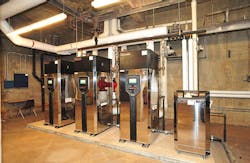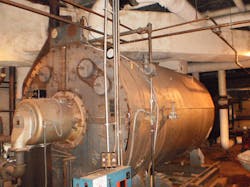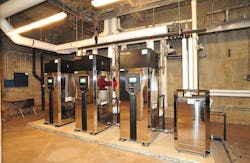ST. LOUIS — Established in 1962 by the Ferguson Church of the Nazarene, the North County Christian School serves more than 325 students in grades pre-K through 12th grade. The school expanded over the years and in 2004, moved to its current 14-acre campus.
Air Masters Corporation, a full-service HVAC, plumbing, piping, building automation and energy conservation firm, completed an extensive boiler upgrade at the school, which ultimately increased efficiency and reliability of the school’s power plant while reducing operating costs. Air Masters’ significant modifications to the North County Christian School’s hot water plant have led to a highly efficient, energy-saving and economical heating system.
With the existing boiler leaking routinely and a number of incoming no-heat calls, “The reliability of the boiler upgrade alone cut down on service calls and maintenance,” said Dan Salomon, vice president, Air Masters Corporation.
In addition, based upon performance and past consumption, Air Masters found the pre-existing, very large Scotch-marine-style boilers, to be inefficient. After running numerous energy models, Air Masters determined the proper system set up for the North County Christian School’s hot water plant.
Slaying the dinosaur
As part of the $275,000 project, the Air Masters’ four-man crew removed the school’s two grossly oversized fire-tube boilers — circa 1956 and part of the original campus — and installed three new Camus DynaForce two million BTU high-efficiency condensing class boilers. The school’s fire-tube water heater was replaced with a Camus DynaMax boiler for its domestic hot water needs, and is piped to hot water storage tank. The controls for the three heating boilers lead lag and integrate and coordinate firing rates to determine the output of each boiler based on system demand. This management is critical for effectiveness and efficiency.
Boiler retrofit leads to energy efficiency at Manchester Memorial
Each of the campus education buildings is served by a dedicated outdoor air system (DOAS) and by baseboard hot water perimeter heat.
“Given the age of the buildings, the original engineers surprisingly used design concepts, which are once again becoming part of energy efficient design coupled with IAQ measures,” said Salomon.
In order to further improve the operation of the plant, Air Masters converted the system from a primary pumping system to a primary/secondary pumping system. The new system allows water to be pumped based on demand rather than continually. More cost-effective, primary/secondary pumps use less energy at partial load. Existing Bell & Gossett pumps and new Armstrong primary pumps were used.
The existing flue was utilized as a chase for the new PVC flues, and because of the large size of the flue, Air Masters needed to weld-up support for the stack before demolition, said Salomon. Moreover, old, horizontal expansion tanks — with no air separation — were replaced with Armstrong diaphragm-style expansion tanks, which eliminate air ingress and dampens water hammer for reduced system corrosion and stress, extending service intervals and overall system life.
Beauty is in aesthetics, savings
Below grade, “the boiler room was old, dark and nasty,” said Salomon. In terms of jobsite safety and aesthetics, Air Masters installed a new lighting system, and there was a significant amount of asbestos abatement for the entire boiler room.
Pre-fab of the piping was conducted back at the shop. In addition, “A crane was used to bring the new boilers in and to remove portions of the old boilers. The impetus behind the smaller piece sizes was to reduce multiple crane uses,” said Salomon.
Air Masters’ new system at North County Christian Schools is approximately 1/6th the physical size of the old plant. By implementing these natural gas efficiency measures, the school received a $10,200 energy savings rebate through Laclede Gas’ Commercial and Industrial Rebate program.


